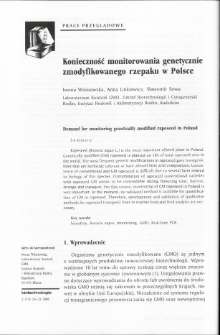- Search in all Repository
- Literature and maps
- Archeology
- Mills database
- Natural sciences
Advanced search
Advanced search
Advanced search
Advanced search
Advanced search

Object
Title: Demand for monitoring genetically modified rapeseed in Poland
Subtitle:
Demand for monitoring genetically modified rapeseed in Poland
Publisher:
Committee on Biotechnology PAS ; Institute of Bioorganic Chemistry PAS
Abstract:
Rapeseed (Brassica napus L.) is the most important oilseed plant in Poland. Genetically modified (GM) rapeseed is planted on 18% of total rapeseed area in the world. The most frequent genetic modifications in rapeseed gave transgenic lines that are herbicide tolerant or have altered fatty acid composition. Coexistence of conventional and GM rapeseed is difficult due to several facts related to biology of this species. Contamination of rapeseed conventional varieties with rapeseed GM seems to be unavoidable during flowering time, harvest, storage and transport. For this reason, monitoring of GM rapeseed in Poland is very important. At the moment, no validated method is available for quantification of GM in rapeseed. Therefore, development and validation of qualitative methods for rapeseed transgenic lines in routine food and feed analysis are necessary.
Relation:
Biotechnologia, vol.74, 3 (2006)-.
Volume:
Issue:
Start page:
End page:
Detailed Resource Type:
Format:
Resource Identifier:
0860-7796 ; oai:rcin.org.pl:87398 ; IChB B-70
Source:
Library of Institute of Bioorganic Chemistry PAS
Language:
Language of abstract:
Temporal coverage:
Rights:
Creative Commons Attribution BY-SA 4.0 license
Terms of use:
Digitizing institution:
Institute of Bioorganic Chemistry of the Polish Academy of Science
Original in:
Institute of Bioorganic Chemistry of the Polish Academy of Science
Projects co-financed by:
Access:
Object collections:
- Digital Repository of Scientific Institutes > Partners' collections > Institute of Bioorganic Chemistry PAS > Articles
- Digital Repository of Scientific Institutes > Literature > Journals/Articles
Last modified:
Sep 24, 2021
In our library since:
Dec 10, 2019
Number of object content downloads / hits:
601
All available object's versions:
https://rcin.org.pl./publication/113839
Show description in RDF format:
Show description in RDFa format:
Show description in OAI-PMH format:
| Edition name | Date |
|---|---|
| Konieczność monitorowania genetycznie zmodyfikowanego rzepaku w Polsce | Sep 24, 2021 |
Objects Similar
Linkiewicz, Anna Wiśniewska, Iwona Sowa, Sławomir
Sławińska, Anna Siwek, Maria
Tyczewska, Agata Bąkowska- Żywicka, Kamila
Pieczyński, Marcin Bielewicz, Dawid Dolata, Jakub Szweykowska-Kulińska, Zofia

 INSTYTUT ARCHEOLOGII I ETNOLOGII POLSKIEJ AKADEMII NAUK
INSTYTUT ARCHEOLOGII I ETNOLOGII POLSKIEJ AKADEMII NAUK
 INSTYTUT BADAŃ LITERACKICH POLSKIEJ AKADEMII NAUK
INSTYTUT BADAŃ LITERACKICH POLSKIEJ AKADEMII NAUK
 INSTYTUT BADAWCZY LEŚNICTWA
INSTYTUT BADAWCZY LEŚNICTWA
 INSTYTUT BIOLOGII DOŚWIADCZALNEJ IM. MARCELEGO NENCKIEGO POLSKIEJ AKADEMII NAUK
INSTYTUT BIOLOGII DOŚWIADCZALNEJ IM. MARCELEGO NENCKIEGO POLSKIEJ AKADEMII NAUK
 INSTYTUT BIOLOGII SSAKÓW POLSKIEJ AKADEMII NAUK
INSTYTUT BIOLOGII SSAKÓW POLSKIEJ AKADEMII NAUK
 INSTYTUT CHEMII FIZYCZNEJ PAN
INSTYTUT CHEMII FIZYCZNEJ PAN
 INSTYTUT CHEMII ORGANICZNEJ PAN
INSTYTUT CHEMII ORGANICZNEJ PAN
 INSTYTUT FILOZOFII I SOCJOLOGII PAN
INSTYTUT FILOZOFII I SOCJOLOGII PAN
 INSTYTUT GEOGRAFII I PRZESTRZENNEGO ZAGOSPODAROWANIA PAN
INSTYTUT GEOGRAFII I PRZESTRZENNEGO ZAGOSPODAROWANIA PAN
 INSTYTUT HISTORII im. TADEUSZA MANTEUFFLA POLSKIEJ AKADEMII NAUK
INSTYTUT HISTORII im. TADEUSZA MANTEUFFLA POLSKIEJ AKADEMII NAUK
 INSTYTUT JĘZYKA POLSKIEGO POLSKIEJ AKADEMII NAUK
INSTYTUT JĘZYKA POLSKIEGO POLSKIEJ AKADEMII NAUK
 INSTYTUT MATEMATYCZNY PAN
INSTYTUT MATEMATYCZNY PAN
 INSTYTUT MEDYCYNY DOŚWIADCZALNEJ I KLINICZNEJ IM.MIROSŁAWA MOSSAKOWSKIEGO POLSKIEJ AKADEMII NAUK
INSTYTUT MEDYCYNY DOŚWIADCZALNEJ I KLINICZNEJ IM.MIROSŁAWA MOSSAKOWSKIEGO POLSKIEJ AKADEMII NAUK
 INSTYTUT PODSTAWOWYCH PROBLEMÓW TECHNIKI PAN
INSTYTUT PODSTAWOWYCH PROBLEMÓW TECHNIKI PAN
 INSTYTUT SLAWISTYKI PAN
INSTYTUT SLAWISTYKI PAN
 SIEĆ BADAWCZA ŁUKASIEWICZ - INSTYTUT TECHNOLOGII MATERIAŁÓW ELEKTRONICZNYCH
SIEĆ BADAWCZA ŁUKASIEWICZ - INSTYTUT TECHNOLOGII MATERIAŁÓW ELEKTRONICZNYCH
 MUZEUM I INSTYTUT ZOOLOGII POLSKIEJ AKADEMII NAUK
MUZEUM I INSTYTUT ZOOLOGII POLSKIEJ AKADEMII NAUK
 INSTYTUT BADAŃ SYSTEMOWYCH PAN
INSTYTUT BADAŃ SYSTEMOWYCH PAN
 INSTYTUT BOTANIKI IM. WŁADYSŁAWA SZAFERA POLSKIEJ AKADEMII NAUK
INSTYTUT BOTANIKI IM. WŁADYSŁAWA SZAFERA POLSKIEJ AKADEMII NAUK




































